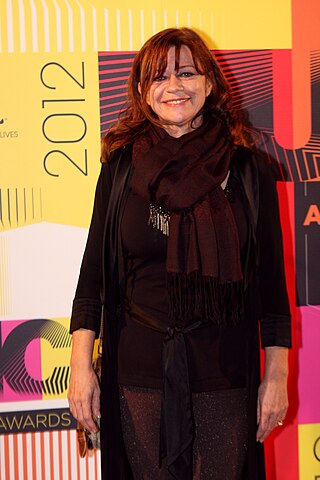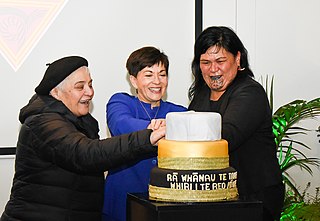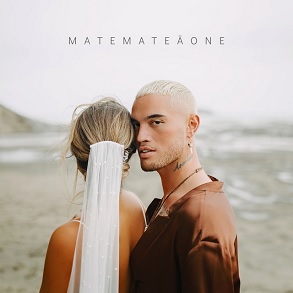Aotearoa is the Māori name for New Zealand.
Contents
Aotearoa may also refer to:
Aotearoa is the Māori name for New Zealand.
Aotearoa may also refer to:
Aotearoa is the Māori-language name for New Zealand. The name was originally used by Māori in reference only to the North Island, with the whole country being referred to as Aotearoa me Te Waipounamu. In the pre-European era, Māori did not have a collective name for the two islands.

The music of New Zealand has been influenced by a number of traditions, including Māori music, the music introduced by European settlers during the nineteenth century, and a variety of styles imported during the twentieth century, including blues, jazz, country, rock and roll, reggae, and hip hop, with many of these genres given a unique New Zealand interpretation.

Jennifer Patricia Morris is a New Zealand-Australian singer-songwriter. Her first success came with New Zealand band the Crocodiles, who had a top 20 hit single with "Tears". Re-locating to Sydney in February 1981, she was a backing vocalist for various groups and formed a trio, QED, in 1983.

Te Wiki o te Reo Māori is a government-sponsored initiative intended to encourage New Zealanders to promote the use of the Māori language which is an official language of the country. Māori Language Week is part of a broader movement to revive the Māori language. It has been celebrated since 1975 and is currently spearheaded by Te Puni Kōkiri and the Māori Language Commission, with many organisations including schools, libraries, and government departments participating.
Waka may refer to:
Traditional Māori music, or pūoro Māori, is composed or performed by Māori, the indigenous people of New Zealand, and includes a wide variety of folk music styles, often integrated with poetry and dance.
Aotea may refer to:
Minuit(pronounced min-wee, French for midnight) were an electronic band from New Zealand, formed in Nelson.
Moana Maree Maniapoto is a New Zealand singer, songwriter and documentary maker. Widely considered one of New Zealand's most successful indigenous acts, her music is described as a fusion of traditional Māori haka, chants and taonga puoro, with contemporary soul, reggae and classical styles. Moana was briefly married to New Zealand politician and radio personality Willie Jackson, during which time she was known as Moana Maniapoto-Jackson; they divorced in 2001. In 2016, Moana was inducted into the New Zealand Music Hall of Fame.
Aotearoa is a concert overture written for orchestra by New Zealand composer Douglas Lilburn in 1940. The overture is the first of three early works by Lilburn which centre on the theme of national identity; the other two are Landfall in Unknown Seas (1942), for narrator and orchestra, and the tone poem A Song of Islands (1946).
Feelings may refer to:

Stan Walker is an Australian-born New Zealand singer, actor, and television personality. In 2009, Walker was the winner of the seventh season of Australian Idol. He subsequently signed a recording contract with Sony Music Australia. In December 2009, Walker released his debut studio album, Introducing Stan Walker, which included the hit single, "Black Box". The album debuted at number three on the Australian ARIA Albums Chart and was certified platinum by the Australian Recording Industry Association (ARIA). It also appeared on the New Zealand Albums Chart at number two and was certified triple platinum by the Recording Industry Association of New Zealand (RIANZ).

Ria Hall is a Māori recording artist and presenter on Maori TV's AIA Marae DIY in 2012-13.

"Aotearoa" is a song by New Zealand recording artist Stan Walker featuring Ria Hall, Troy Kingi and Maisey Rika. It was released as a single through Sony Music Australia on 21 July 2014. "Aotearoa" peaked at number two on the New Zealand Singles Chart.

Te Arohanui is the sixth studio album by New Zealand recording artist Stan Walker. It is Walker's first in te reo Māori and released on 17 September 2021 by Sony Music New Zealand and features a combination of Walker's greatest hits re-recorded in te reo Māori and several new tracks. The album was announced on 31 August 2021 and is dedicated to his late grandmother.

Faith Hope Love is the second extended play (EP) by Australian-New Zealand recording artist Stan Walker. It was released in Australia and New Zealand on 31 May 2019 by Grace Promotions. The EP was dedicated to the victims of the Christchurch mosque shootings with proceeds from the sale of the EP to go to Muslim families affected by this event.

Troy Kingi is a New Zealand musician and actor from Northland, first receiving media attention when he appeared in the 2013 film Mt. Zion. Kingi is a multi-instrumentalist, is known for his 10/10/10 project: the plan to release 10 albums in 10 genres across 10 years.

Maisey Rika is a New Zealand singer, songwriter and composer, performing in both English and Māori. Her five original albums have each reached the Top 40 in the Official New Zealand Music Chart. She was named an Arts Foundation Laureate in 2021, has received awards at the Waiata Māori Music Awards and APRA Awards, including APRA Best Māori Songwriter in 2010 and 2013, and has twice won Best Māori Language Album at the NZ Music Awards.

"35" is a song by New Zealand youth choir Ka Hao featuring musician Rob Ruha. "35" was the group's first single, and preceded the release of their debut album Ka Hao: One Tira, One Voice. The song, performed primarily in Māori, was a sleeper hit, first entering the New Zealand Singles Chart in Te Wiki o te Reo Māori in September 2021 and peaking at number 12 in November. "35", alongside New Zealand band Six60's song "Pepeha", are the best performing songs sung in Māori since Stan Walker's "Aotearoa" (2014).

"Matemateāone" is a song by New Zealand musician Stan Walker. A bilingual ballad sung primarily in Māori language, the song was released as a single a week before Walker's first album sung in Māori, Te Arohanui. A love ballad, the song's music video celebrates his marriage to his partner Lou Tyson.